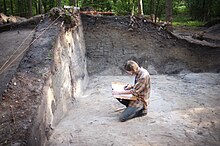
Back Documentació Catalan Dokumentalistika Czech Dokumentationswissenschaft German Documentación Spanish Dokumentaatio Finnish Documentation French Dokumentalistika Croatian Documentazione (gestione della conoscenza) Italian Dokumentasjonsvitskap NN Dokumentasjonsvitenskap NB
This article includes a list of general references, but it lacks sufficient corresponding inline citations. (January 2014) |

Documentation science is the study of the recording and retrieval of information.[1] Documentation science gradually developed into the broader field of information science.
Paul Otlet (1868–1944) and Henri La Fontaine (1854–1943), both Belgian lawyers and peace activists, established documentation science as a field of study. Otlet, who coined the term documentation science, is the author of two treatises on the subject: Traité de Documentation (1934) and Monde: Essai d'universalisme (1935). He, in particular, is regarded as the progenitor of information science.
In the United States, 1968 was a landmark year in the transition from documentation science to information science: the American Documentation Institute became the American Society for Information Science and Technology, and Harold Borko introduced readers of the journal American Documentation to the term in his paper "Information science: What is it?". Information science has not entirely subsumed documentation science, however. Berard (2003, p. 148) writes that word documentation is still much used in Francophone countries, where it is synonymous with information science. One potential explanation is that these countries made a clear division of labour between libraries and documentation centres, and the personnel employed at each kind of institution have different educational backgrounds. Documentation science professionals are called documentalists.
- ^ Rayward, W. B. (1994). "Visions of Xanadu: Paul Otlet (1868-1944) and hypertext". Journal of the American Society for Information Science. 45 (4): 235–250. doi:10.1002/(SICI)1097-4571(199405)45:4<235::AID-ASI2>3.0.CO;2-Y.